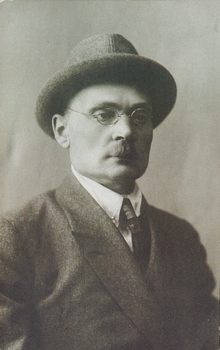Jasep Ljosik
Jasep Lyosik ( Belarusian Язэп Лёсік ; born November 18, 1883 in Mikalaeuschtschyna in Stoubzy Rajon ; † April 1, 1940 in Saratov ) was a Belarusian political and social activist, philologist, writer and teacher. From June 1918 to December 1919 he was President of the Belarusian People's Republic (BNR).
Lyosik was an uncle of the Belarusian national poet Jakub Kolas .
Life
From 1898 to 1899 Lyosik was initially trained at a teachers' school in Maladsetschna and received his school leaving certificate in Nowhorod-Siverskyj in 1902 . In 1905 he was exiled to Siberia because of his participation in a revolutionary movement . In 1907 he managed to escape from prison and Lyosik went into hiding until he was captured in 1911 and exiled to Siberia for life. In Irkutsk , Lyosik wrote for the newspaper Nascha Niwa . After the February Revolution of 1917 he was able to return to Belarus, where he became one of the co-founders of the Belarusian Socialist Hramada party . From 1907 to 1908 Lyosik wrote for the newspaper Free Belarusand in 1917 campaigned for the autonomy of Belarus within the Russian Federation. After holding the 1st Belarusian People's Congress, Ljosik supported the idea of establishing an independent Belarusian state. During the German occupation in World War I , Lyosik worked in Minsk and was one of the initiators of the proclamation of the Belarusian People's Republic . On April 25, 1918, he signed a telegram to the German Emperor Wilhelm II , in which it was stated that the future of Belarus was only conceivable under a German protectorate. As a result of the split in the Belarusian Social Democratic Hramada, Lyosik became one of its leaders. From June 1918 he was President of the Rada BNR , the government of the Belarusian People's Republic. After the split of the Rada BNR, Ljosik took over the office of chairman of the BNR High Council on December 13, 1919.
After the end of the war he stayed in Belarus and recognized the government of the Belarusian Soviet Socialist Republic (BSSR). Lyosik taught at the University of Minsk and at the School of Pedagogy. He translated the Communist Party's manifesto into Belarusian and was elected a member of the Institute of Belarusian Culture in 1922. In the same year he published a book on the grammar of the Belarusian language, which was slandered as counter-revolutionary by the government newspaper Svyazda . He was arrested but released at the request of BSSR People's Commissar Usewalad Ihnatouski. In November 1926, Ljosik held a conference which campaigned for a reform of the Belarusian grammar and the Belarusian alphabet. In July 1930 he was arrested again on charges of having ties to the "Union for the Liberation of Belarus" (Belarus: Саюз вызваленьня Беларусі), an organization that did not actually exist. On December 6, 1930, he lost his academic title. On April 10, 1931, he was sentenced to five years' exile in Kamyshin . In November 1934 Lyosik received an amnesty, but was not allowed to return to Belarus. Instead, he lived with his family in Bryansk and was arrested again in June 1938. In 1940 Lyosik was sentenced to five years in prison for anti-Soviet agitation and died in Saratov prison that same year . In 1958 he was rehabilitated. He wrote several books on the history of Belarus, as well as Belarusian linguistics .
Individual evidence
- ^ Wojciech Roszkowski , Jan Kofman (Ed.): Biographical Dictionary of Central and Eastern Europe in the Twentieth Century. Routledge, Abingdon et al. 2015, ISBN 978-0-7656-1027-0 , p. 581.
| personal data | |
|---|---|
| SURNAME | Ljosik, Jasep |
| ALTERNATIVE NAMES | Лёсік, Язэп (Belarusian) |
| BRIEF DESCRIPTION | Belarusian political activist |
| DATE OF BIRTH | November 18, 1883 |
| PLACE OF BIRTH | Mikalaeuschtschyna in the Stoubzy district |
| DATE OF DEATH | April 1, 1940 |
| Place of death | Saratov |

